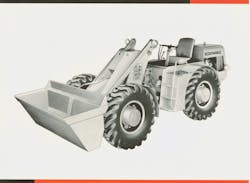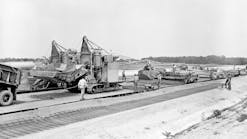The Mixermobile’s drum was charged by a skip that was winched up an incline on the front of the truck and then flipped to charge the mixer from above. Looking for a more efficient means of charging the skip, Mixermobile developed one of the world’s first wheel loaders. Dubbed the Scoopmobile, the loader had an unusual tricycle arrangement with driver tires in the front and a steering bogey with paired tires on a swivel at the back. It steered by means of a tiller handle, much like a sailboat, and could be towed at highway speeds behind a truck.
This basic loader design continued into the 1970s and found great favor with highway departments and ready-mix companies, especially in the western states, because of its superior maneuverability.
But the Wagners’ greatest contribution to wheel loader design came in 1953 when they introduced the LD5 and LD10 Scoopmobiles. Rated at 1 and 2 cubic yards, respectively, these were the world’s first articulated-frame wheel loaders. The articulation allowed for up to 20 degrees “bucket swing,” as their sales literature put it. Not only was the steering articulated, but the pivot point also provided left and right oscillation from horizontal.
The LD5 series was produced until 1965, and the LD10 was discontinued in the late 1950s or early 1960s. Mixermobile went on to build an extensive line of models, including a couple of loaders that were, during their production runs, among the world’s largest. But despite its design advantages, the Scoopmobile line never achieved its full potential for success, and it wasn’t until the Euclid Division of General Motors introduced their version of articulated steering in 1959 that the design really took off to become today’s industry standard.
The Wagners sold the Scoopmobile line to Wabco in 1968, and Wabco phased it out after a couple of years. The three-wheel Scoopmobile lived on under designs by Gerlinger Carrier Co. and Eagle Crusher Co., and the Wagners’ loader ideas finally hit their full stride in their successful line of underground equipment that was acquired by Atlas Copco in 1990.
This text is abridged from a history of Mixermobile Manufacturers in Issue 42 of Equipment Echoes, the quarterly magazine of the Historical Construction Equipment Association (HCEA). Information is available at 419.352.5616 or [email protected].





